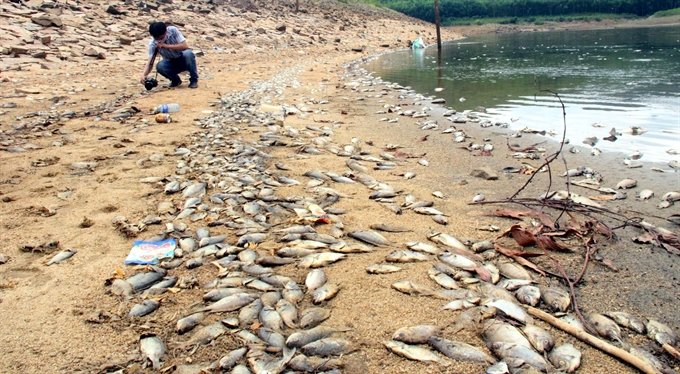 Society
Society

The environment cannot be allowed to be destroyed for the sake of socio-economic development, Prime Minister Nguyễn Xuân Phúc told an online environment protection conference with 63 localities yesterday.
 |
| Mass fish deaths in Phước Hà Lake in central Quảng Nam Province’s Bình Phú Commune. The environment in Việt Nam is being pressured by socio-economic development activities and competition pressure from the global integration process, the environment minister says.— VNA/VNS Photo Đỗ Trưởng |
HÀ NỘI – The environment cannot be allowed to be destroyed for the sake of socio-economic development, Prime Minister Nguyễn Xuân Phúc told an online environment protection conference with 63 localities yesterday.
He said many cases of environmental pollution and violations of environment protection regulations in the past had led to great public concern. The situation had worsened over many years of socio-economic development, affecting the living conditions of local people and causing social disorder, he said.
Environmental pollution could be found not only in one field but in many fields, he said, adding that many “hot spots” of environmental pollution had appeared and could lead to negative effects if they were not handled properly.
Water, air and land pollution have become more serious over the years, particularly at industrial complexes, craft villages and in rural and even urban areas.
Minister of Natural Resources and Environment, Trần Hồng Hà, said the environment in Việt Nam was being pressured by socio-economic development activities and competition pressure of the global integration process.
Each year, more than 2,000 projects were required to make environment impact assessment reports, he said. An estimated 47 tonnes of hazardous waste and 125,000cu.m of medical wastewater are discharged from industrial zones, production establishments, businesses and craft villages, as well as medical units, into the environment each day.
As much as three million cu.m of waste water is released from 787 cities each day, most of which is not properly treated, and together with the operation of nearly 43 million motorbikes and 2 million cars pumping exhaust fumes into the atmosphere, the effects on the environment can be devastating.
Hà also reported that over 23 million tonnes of household rubbish and 7 million tonnes of industrial solid waste are discharged into the environment each day. At present, there are 458 waste dumping sites, but 337of them do not meet sanitation standards, and over 100 small-scale incinerators for household waste, which have a great impact on the environment, he said.
The minister also said the exploitation of minerals and natural resources, and construction of hydropower plants also contributed to the environmental issue.
Additionally, foreign direct investment businesses have started to shift their capital flows to sectors that consume huge amount of energy and natural resources, but are not environmentally friendly such as metallurgy, shipbuilding, garment and textiles, footwear and mineral exploitation, he said.
Hà noted that several foreign direct investment projects had violated environment protection regulations. In the latest case, the Taiwanese Hưng Nghiệp Formosa Hà Tĩnh Steel Corporation had released toxic wastewater into the sea along some central provinces, causing serious pollution that killed a massive amount of fish in these localities earlier this year.
Statistics from the four affected provinces reported some 277 tonnes of dead fish – both washed up on the beaches and farmed fish from the sea, causing estimated economic losses totaling more than VNĐ260 billion ($11.5 million). Further, at least 123,000 fishermen and locals who rely on the sea for a living or who work in the tourism industry were severely affected by the incident. This has not taken into account the damages to the local environment.
Hà said one of key reasons behind these environmental pollution issues is the lack of awareness and responsibilities of a number of investors, authorised agencies, sectors, authorities, business organisations and the community.
The act of taking into account initial economic profits while making light of environmental protection remained popular, particularly in the process of assessing, approving and implementing investment projects, he said.
Time to change
For better environmental protection, PM Phúc said it was time to change the development mindset towards promoting socio-economic development in close connection with environmental protection and sustainable development, with a resolution not to harm the environment in exchange for initial profits.
Environmental protection must be taken into consideration during the whole development process, he said. “In that spirit, we will not attract investment by all means and will pay attention to environmental criteria when choosing investment projects,” he said.
“We will not allow investment in projects and production models that have high risks of causing environmental pollution,” Phúc said.
He said ministries, agencies, sectors and localities should take a more frank look at the actual situation of environment pollution for better awareness, more effective solutions and more practical and concrete efforts to deal with the issue.
It was also essential to acknowledge shortcomings and weaknesses in State management that allowed environmental pollution to happen, he said. It mean that we should clarify the responsibilities of relevant agencies, particularly the management role of the natural resources and environment ministry, and of natural resources and environment departments in localities, Phúc said. Chairmen of the people’s committees of localities will have to take responsibility before local people and the Government if serious environmental incidents happen in their localities.
The Government leader also pointed out shortcomings and difficulties in environmental protection, such as the lack of awareness of abiding by environmental protection regulations and ineffective State management.
Officials in charge of the environment lacked professional skills, particularly those at localities and some officials remained irresponsible; and resources for investment in environment protection remained limited, he said.
He said the Government will issue a Directive on environmental protection right after the conference and urged authorities at localities to actively review environmental issues in their areas and build plans to tackle these issues. - VNS




